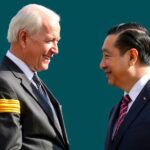Biden’s Historic Visit to Angola: Implications for U.S.-China Competition and Economic Diversification
President Joe Biden will be the first sitting U.S. president to visit Angola, focusing on the Lobito Corridor project and reinforcing U.S. influence amidst competition with China for mineral resources. This visit occurs as Angola’s government seeks to diversify its oil-dependent economy and reduce reliance on Chinese investments, which have historically influenced its infrastructure development and economic conditions.
President Joe Biden is poised to make history as the first sitting United States president to visit Angola, a significant move given the context of increasing competition between the West and China for access to vital mineral resources in Africa. His arrival is emblematic of the ongoing efforts to enhance American influence in the region, significantly focusing on the Lobito Corridor project, which is aimed at bolstering transportation and trade between Angola, Zambia, and the Democratic Republic of the Congo.
This visit is particularly crucial as Angola seeks to diversify its economy beyond its longstanding reliance on oil. President Joao Lourenco’s administration has been transparently addressing the negative impacts of excessive reliance on Chinese investments that often perpetuated debt. The backdrop of Biden’s trip includes Angola’s historical relationship with China, which provided substantial financial assistance post-civil war, assisting in the construction of infrastructure, including housing, roads, and railways. The Biden administration’s focus on Africa signifies a broader strategic shift, intending to counter China’s growing dominance in the continent’s economic landscape.
Angola has historically been a focal point of competition between Western nations and China, particularly regarding access to its abundant mineral resources. After the civil war that ended in 2002, China emerged as a significant investor, financing extensive infrastructure development, thereby establishing a considerable economic foothold. However, there is a growing awareness in Angola of the potential pitfalls associated with over-dependence on Chinese investments, prompting a shift in focus towards economic diversification, particularly in sectors beyond oil production. Biden’s visit underscores the U.S. intent to re-engage with African nations through strategic partnerships that address both economic development and resource management.
In conclusion, President Biden’s visit to Angola marks a pivotal moment in U.S. diplomacy in Africa, as it reflects an important effort to counter China’s expansive influence in the region. With an emphasis on the Lobito Corridor and efforts to diversify Angola’s economy away from oil dependence, this visit could signify a shift towards a more balanced and equitable economic partnership with African nations. The strategic importance of this visit cannot be understated, as both the U.S. and Angola strive to navigate their future relationship in a rapidly evolving geopolitical landscape.
Original Source: www.scmp.com








Post Comment